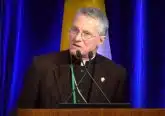US bishops ask Supreme Court to protect Catholic foster agency in Philadelphia
Washington D.C., Jun 4, 2020 / 04:27 pm MT (CNA).- In a brief filed with the Supreme Court, the U.S. bishops argued that a Catholic agency should not be banned from participation in the Philadelphia foster care system due to its beliefs on marriage.
“The Catholic Church serves orphans through adoption and foster care not simply because it cares about children, but because it is compelled to do this work—out of obedience to God’s Word, and in response to God’s love toward mankind,” the amicus brief said. “The Church’s theological commitment, present from its inception, to providing this privileged form of ministry helps illustrate the irreparable harm that the Church would suffer should it be blocked from continuing to do so.”
“Across the centuries and up to today, across the world and in the United States, the Catholic Church has been at the forefront of caring for orphans by placing them in loving homes,” the brief continued.
“This history, and the theological basis that animates it, together make clear that providing foster care represents a core religious exercise for Catholics. Although this ministry also serves the common good, and is often carried out in cooperation with government, these considerations do not reduce this ministry to a ’public function’ like picking up garbage or paving roads.”
The U.S. Conference of Catholic Bishops and the Pennsylvania Catholic Conference filed the brief June 3 with the U.S. Supreme Court regarding the case Sharonell Fulton et. al. vs. City of Philadelphia.
In March 2018, Catholic Social Services of the Archdiocese of Philadelphia was informed that the city would no longer refer foster children to the agency for assistance because of its faith-based stance on same-sex marriage. The city then passed a resolution calling for an investigation into religiously-based foster care services, after a same-sex couple claimed they were discriminated against by a different faith-based agency.
Catholic Social Services is barred from making new placements unless it agrees to recommend same-sex couples for the adoption of children.
Before the relationship ended, the agency served about 120 foster children in 100 foster homes. In 2017, the charity says, it helped more than 2,200 children in the Philadelphia area. The city has worked with the agency for over 100 years.
The U.S. Conference of Catholic Bishops said it joined the brief because the case “raises the important question whether churches and other religious organizations can continue to provide critical human services, as organized communities of religious adherents have done for centuries, without surrendering their religious beliefs.” The conflicts in the case are similar to those between Catholics and civil authorities elsewhere in the U.S.
For its part, the Pennsylvania Catholic Conference joined the brief because it believes all dioceses in the state have a common interest in the question of whether a Pennsylvania municipality “should impose a substantial burden on the exercise of a fundamental aspect of church ministry.”
Placing abused and neglected children with foster families is “still an important religious activity,” the brief said. It sided with Catholic Social Services’ testimony that its work with foster children is “an important religious ministry” and that Philadelphia’s efforts to block this work “burden its religious liberty.”
The brief objected to the Third Circuit court’s depiction of foster care as “essentially a public service.” It argued against claims that the Catholic agency is just another government contractor, and that facilitating foster care placements is just another public service activity that the agency is “free to undertake or not, as it chooses.”
The bishops’ amicus brief argued that the court should reject the claim that “foster care placements stopped being a religious exercise in Philadelphia when it became a city-managed ‘public service’.”
“This either-or, all-or-nothing approach is incompatible with this court’s religion clauses jurisprudence,” the brief continued. “It also flies in the face of common sense. It cannot be that an activity, traditionally undertaken by religious groups for religious reasons, loses all religious liberty protections as soon as government encompasses it within a regulatory framework.”
“In whatever sense foster care might today be a ‘public service,’ it cannot be the case that the government can so easily deprive the Catholic Church of the opportunity to continue a ministry that has been a core part of its identity for nearly 2,000 years,” said the brief.
The U.S. Court of Appeals for the Third Circuit ruled against Catholic Social Services in an April 22 ruling, saying that the city’s non-discrimination policy is “a neutral, generally applicable law.” Circuit Judge Thomas Ambro said “the religious views of CSS do not entitle it to an exception from that policy.” He said the city is “on firm ground” in requiring contractors to have non-discrimination policies and has shown “good faith” in enforcing these laws against discrimination rather than exhibiting an anti-religious bias.
In August 2018 the Supreme Court declined to grant an injunction that would require the city to continue its foster-care placement with the agency during litigation over the matter. Due to the coronavirus epidemic, the Supreme Court postponed oral arguments in the case. The postponement could cause continued harm to the agency, which is on a “wind-down” contract and has laid off employees. This is despite the presence of families who want to adopt children through the agency and work with it.
The brief gave an overview of Catholic history and exhortations to care for orphans and children in need in Scripture and other Catholic teaching.
“(T)he Catholic Church has been helping orphans and other vulnerable children in Philadelphia for more than 200 years,” said the brief, adding “the Catholic Church’s commitment to this ministry flows from Scripture and Church teaching, from the early church fathers through Pope Francis.”
The early Christian practice of taking in children who had been put out for exposure under Roman customs was cited in the brief. Some of the Church’s greatest saints and religious orders were devoted to caring for orphans and children in need, it said. In American history, the Catholic Church, especially women religious, played an enormous role in serving orphans. The brief cited the examples of St. Elizabeth Ann Seton, St. Frances Cabrini, and Mother Joseph of the Sisters of Providence, and Father Edward Flanagan of Boys Town.
The plaintiffs in the Supreme Court case include Sharonell Fulton and Toni Simms-Busch. Fulton has fostered more than 40 children through the agency, while Simms-Busch adopted children she fostered through the agency. The plaintiffs said they chose to work with the agency because it matches their personal beliefs and values.
Becket, a law firm specializing in religious liberty cases, is representing the plaintiffs.
Becket said the Catholic agency has not been the subject of any discrimination complaints by same-sex couples. It had never been asked to certify or endorse a same-sex couple, and no couple had been turned away from fostering because of the agency’s beliefs.
Some 34 amicus briefs have been filed in the case on the side of the plaintiffs. These briefs have been co-signed by over two dozen religious organizations, major faith-based foster-care ministries, 82 state legislators from seven states, 76 members of Congress, law professors and former Attorney General Ed Meese. Thirteen states signed one brief saying the partnership between government and religious ministries is “invaluable” and deserves First Amendment protections. Another three states filed a brief about the dependence of state and local governments on religious foster agencies.
“These groups recognize that Philadelphia’s actions don’t just threaten CSS and its foster families—or even faith-based foster agencies nationwide,” Becket said. “Rather, Philadelphia’s arguments would undermine the constitutional guarantee of religious liberty for all, anywhere.”
Religious organizations backing the plaintiffs include the Union of Orthodox Jewish Congregations of America, the Lutheran Church—Missouri Synod, the United Sikhs, the Bruderhof, the Islam & Religious Freedom Action Team, and the International Society for Krishna Consciousness.
“It’s easy to support a foster agency that has been uniting vulnerable children with loving families for over 100 years, so it’s no wonder CSS has received such broad and diverse support at the Supreme Court,” Lori Windham, senior counsel at Becket, said June 4.
“Faith-based agencies are some of the best at combating the foster care crisis across the nation, yet across the country, they face threats from those who disagree with their religious beliefs,” said Windham. “I am hopeful that the Court will recognize that faith-based agencies are rightfully part of the solution and shouldn’t be subject to the political appetites of their adversaries.”













